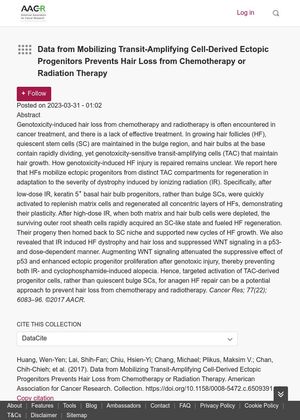Mobilizing Transit-Amplifying Cell-Derived Ectopic Progenitors to Prevent Hair Loss from Chemotherapy or Radiation Therapy
March 2023
chemotherapy radiotherapy hair follicles genotoxic stress ectopic progenitors transit-amplifying cells low-dose ionizing radiation high-dose ionizing radiation basal hair bulb progenitors hair matrix cells outer root sheath cells stem cell-like state WNT signaling p53 cyclophosphamide chemo radiation therapy hair roots stress from toxins progenitor cells TAC low-dose IR high-dose IR hair bulb cells hair matrix outer root sheath stem cells WNT pathway p53 protein Cytoxan

TLDR Activating certain cells in hair follicles can prevent hair loss caused by cancer treatments.
The study investigates how hair follicles (HFs) repair themselves after genotoxic damage from chemotherapy and radiation therapy, which often causes hair loss. It was found that after low-dose ionizing radiation (IR), keratin 5+ basal hair bulb progenitors, rather than quiescent stem cells (SCs) in the bulge, are activated to regenerate hair follicles. In cases of high-dose IR, surviving outer root sheath cells acquire an SC-like state to fuel HF regeneration. The study also revealed that IR-induced hair loss is associated with suppressed WNT signaling in a p53-dependent manner. Enhancing WNT signaling can counteract this suppression, promoting ectopic progenitor proliferation and preventing hair loss. This suggests that targeting transit-amplifying cell-derived progenitors for hair follicle repair could be a potential strategy to prevent hair loss from chemotherapy and radiotherapy.

